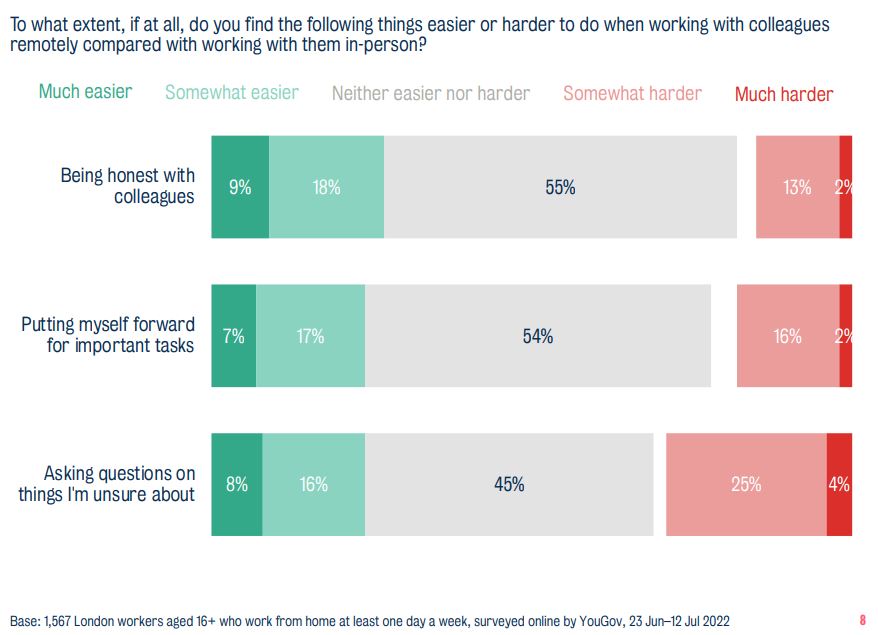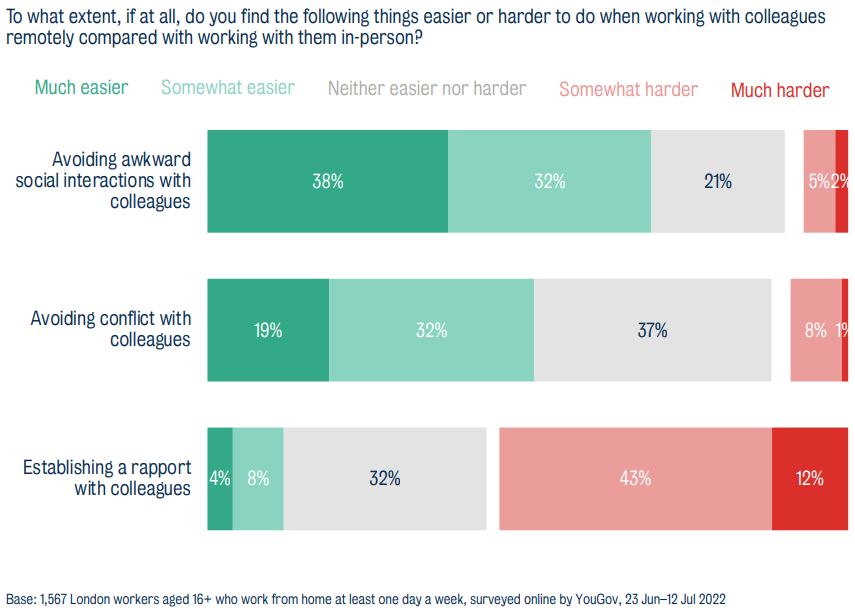
In a new survey, 45% of young workers say remote working has made it easier for them to ask questions when they are unsure. That’s nearly twice the rate of 25 to 49 year olds (24%) and three times the rate of those 50 years and older (14%).
In September, just after the long Labor day weekend no less, a flood of remote workers poured back into the nearly empty office buildings. Forbes reported that while still well below pre-pandemic levels, workers in 10 major metros reported to offices at the highest percentages since the pandemic the week following the holiday celebrating worker rights. Leaders of big companies from Goldman Sachs to Apple have ordered workers back to office at least a few days a week.
Arguments in favor of return to work, usually made by managers and CEOs, is that remote work stifles spontaneous collaboration, slows teams, and disadvantages young professionals trying to carve their path in a new career.
But, a new survey of workers from King’s Business School finds that workers, even young professionals, value the flexibility and other benefits remote or hybrid work offers more than the less tangible career benefits working in an office supposedly provides. In fact, younger workers believe that remote work will actually help their advancement prospects.

Source: ‘Embracing the new normal? How London is living with hybrid working’
YOUNG WORKERS BELIEVE REMOTE WORK FLATTENS HIERARCHIES
Of people ages 16 to 24, 45% say remote working has made it easier for them to ask questions when they are unsure. That’s nearly twice the rate of 25 to 49 year olds (24%) and three times the rate of those 50 years and older (14%).
Younger professionals are also more likely to say that remote work makes it easier for them to volunteer for important tasks or projects (40%), compared to 25% of 25 to 49 year olds and 13% of those 50 and older.
“A key concern for many business leaders is how our new hybrid way of working will affect the development of younger staff just starting out in their careers. Development often comes from observing others, and opportunities from chance connections made when people get together. But our study shows that younger workers don’t share these concerns to the same extent as older workers,” says Professor Bobby Duffy, director of the Policy Institute at King’s College London.
“This could be because younger workers don’t realize what they’re missing – but it could also be that older workers are stuck with an outdated view of how development can happen. Younger workers are more likely to see the positive potential in how the use of technology can flatten hierarchies to allow them to ask questions, put themselves forward and build connections. But concerns do remain among both old and young about what we might lose, so, as with hybrid working generally, the task for leaders is to focus on extracting the best from both ways of working.”

Source: ‘Embracing the new normal? How London is living with hybrid working’
HYBRID WORK NOW EXPECTATION FOR MANY PROFESSIONALS
This summer, King’s Business School and the Policy Institute at King’s College London surveyed 2,030 London workers ages 16 and older on their opinions about hybrid working. While their report, “Embracing the new normal? How London is living with hybrid working,” is London specific, companies and employees around the U.S. and the world are grappling with similar questions. In a Highered survey this summer of business school students around the world, 27% preferred fully remote work while 26% reported that they would not work for an employer who didn’t offer remote options.
In the King’s Business School report, 65% of London workers in all age groups say hybrid work is a deal breaker: They would look for a new job if their employer made them follow a work pattern they didn’t like. Just 9% say they wouldn’t quit.
At the same time, workers are generally willing to travel to their workplaces for meetings, projects, events, and certain tasks. Of those who work from home at least a day a week 59% say they’d feel positive about doing so, compared with 11% who say they’d feel negative.
“The benefits of hybrid working for London workers are clearly laid bare by our survey findings. But what we are also seeing now is some potential trouble on the horizon: while workers can maybe complete more tasks from home in a more stress-free environment, organizations allowing too much of this are probably missing out on the complex, messy and collaborative outcomes workers only achieve together in a room,” says Michael Clinton, professor of work psychology at King’s Business School,
“But if employers start to force people back into offices there will be a backlash and workers may quit. So, striking the right balance is going to be key – both for workers who want to retain their new-found sense of control, but also for the workers looking for a vibrant work culture.”

Source: ‘Embracing the new normal? How London is living with hybrid working’
DOES HYBRID MAKE IT HARD FOR YOUNG PROFESSIONALS TO MAKE FRIENDS?
There are tradeoffs for hybrid workers, of course. A major argument made by managers and others who advocate for in-office teams is that building rapport, friendships, and meaningful work relationships is harder for hybrid and remote workers. This, in turn, can affect career advancement for younger professionals.
A majority of all respondents, and from all age groups, somewhat agreed: 55% of survey respondents who work from home at least one day a week reported that it makes it harder to build rapport with their colleagues.
However, the survey found that younger workers are more likely to believe that remote work actually HELPS them build rapport than their older colleagues. While 21% of 16 to 24 year olds feel this way, just 8% of those 50 and older do.
“While employees continue to value face-to-face collaboration for building rapport with colleagues, many now see choice over working methods, and the freedom and flexibility which accompanies this choice, as a non-negotiable condition of employment,” says Amanda Jones, lecturer in human resource management and organizational behavior at King’s Business School.
“Even younger employees, often considered to lose out the most from remote working in a professional sense by older age groups, state a strong preference for retaining their hybrid working status going forward. Employees’ discovery that hybrid working enables them to manage and perform their professional and personal roles in an optimum way while simultaneously achieving life goals, such as living in a preferred location or properly, provides an explanation for this preference.”
EMPLOYERS: PROCEED WITH CAUTION
The surveyed remote employees suggest that employers need to proceed cautiously if they hope to compete for the top talent in the future of work. People with flexible schedules feel better prepared to do their jobs well than those who work full-time in the office, and it’s not really close.
47% of hybrid workers and 53% of fully remote workers report that they feel better about doing their jobs well than before the COVID-19 pandemic compared to just 21% of the full-time commuters. Further, 63% of hybrid and 60% of fully remote workers feel a greater sense of freedom at work, compared to 24% of those who commute five days a week.
However, the practical benefits of working remotely – saving time and money on the commute and better work-life balance – are the most important factors in workers’ remote work preferences. Of hybrid and remote workers, 63% rate practical reasons as more important than freedom and control in their work.
“With rising living and commuting costs and escalating work demands, organizations’ continued willingness to facilitate employees’ flexibility through hybrid working may contribute to their positive feelings of trust and support. It seems that employers who are willing to accommodate employees’ working preferences where feasible will be best placed to compete in the ongoing war for talent,” Jones says.
Read the full report here.
DON’T MISS: NEW DATA: UP TO 1/4 OF HIGH-PAYING JOBS COULD BE REMOTE BY 2023 and RANKING: UNIVERSITIES MOST LIKELY TO LAND YOU A JOB IN TECH











Questions about this article? Email us or leave a comment below.